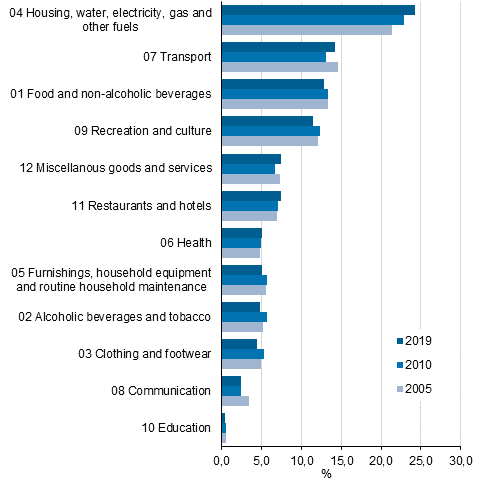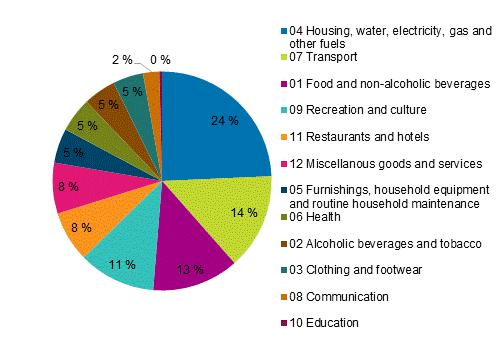Weight structure and commodity basket of the Consumer Price Index are updated for the year 2019
Weight structure
The weight structure of the Consumer Price Index 2015=100 is based on data on private consumption expenditure in National Accounts from the year 2017. The value of consumption expenditure is revised with an inflation coefficient to get as up-to-date data as possible about private consumption in 2018. In 2018, the value of total consumption was EUR 106 billion.
National accounts data on consumption expenditure are only available at a rough level. To the extent that the division of consumption items is not accurate enough, the weight of the rough level is divided into sub-items, primarily with the help of the Household Budget Survey. In addition, sub-items are defined by using statistical data produced by other statistics, the Bank of Finland's statistics and sales data of central retail corporations and unions.
The weights of the Consumer Price Index are composed of the value of goods and services bought by households in Finland. Households also include the consumption of tourists in Finland and institutional households. The concept of private consumption in the Consumer Price Index differs from the concepts used in national accounts and the Household Budget Survey and its coverage is also different. Further information can be found in Consumer Price Index 2015=100 Handbook for users, p. 9.
Figure 1. Share of the commodity group in total concumption (%) in 2005, 2010 and 2019

Figure 1 above compares consumption in three years by main group. It can be seen that starting from 2005, the three largest main groups of total consumption are: 04 Housing, water, electricity, gas and other fuels, 07 Transport and 01 Food and non-alcoholic beverages.
When comparing changes in the main groups over time, it can be seen that most change has occurred in group 04 Housing, water, electricity, gas and other fuels. Its share of total consumption has increased by 14 per cent between 2005 and 2019. In 2005, the group’s share of total consumption was 21.3 per cent, when in 2019 the share was 24.3 per cent. Group 08 Communication has had most fall in value share. It decreased by 31 per cent in 2005 to 2019. Figure 2 shows the structure of private consumption for the year by main group.Figure 2. Structure of consumption on 2019 by commodity group, per cent of total consumption

Commodity basket and classification
The index calculation is based on a commodity basket that is updated along with changes taking place in consumption. Commodities whose consumption is at least one per mil or more of total consumption are added to the commodity basket and commodities whose value share has fallen under one per mil of total consumption are removed from it. With the help of the annually updated commodity basket, the inclusion of representative products and services in the Index is ensured.
In the definition of commodities, the commodity classification introduced in 2016 is used (eCOICOP, European Classification of Individual Consumption According to Purpose), which is based on the UN’s Classification of Individual Consumption According to Purpose. In accordance with EU guidelines, the commodities are divided into 5-digit level sub-groups, with the help of which the products and services are separated into own entities. The Finnish national classification is more detailed than this, including sub-divisions on the 6- and 7-digit levels complementing the sub-groups. The sub-division is revised when new commodities are added to the commodity basket or removed from it.
At the beginning of 2019, a few new commodities were added to the commodity basket and some commodities were removed due to low consumption. New and removed commodities are listed in the table below.
Table 1. Revisions made to the commodity basket at the beginning 2019
| Added, new commodity | Removed commodity |
| Drinking glass | Wine glass |
| Container for frozen food | Waste conteiner |
| Baby Supply | Pram |
| Plastic carrier bag, Hair removal product | |
| Clothing fabric, BlueRay player, Printer, Outboard motor, Printer Ink cartridge, Camping fee |
Changes in the data collection material in 2019
Scanner data were introduced in the statistics for January 2019, covering montly sales volumes and prices of products sold in daily consumer goods trade. The data supplement the existing regional collecting of prices of daily consumer goods.
The data introduced now describe one business chain’s monthly sales comprising around 45,000 separate products. Compared with the conventional price collection, where prices of around 140 food products are collected based on a sample, the change is significant. In future, the index series for group 01.1 Food describes the change in prices even more accurately.
To ensure the data protection of enterprises, the most detailed classification level used in the statistics has been made less detailed. Therefore, the publication of average prices of commodities has also been discontinued.
Weight structure of the Harmonised Index of Consumer prices is also revised every year
Statistics Finland has also updated the weight structure of the Harmonised Index of Consumer Prices calculated for Eurostat, the Statistical Office of the European Union. Its base year is the same as that of the national Consumer Price Index, 2015=100.
The Harmonised Indices of Consumer Prices are primarily used in price comparisons between the EU countries. The European Central Bank uses the Harmonised Index of Consumer Prices as the measure of inflation in its monetary policy.
The Finnish Harmonised Index of Consumer Prices is mainly based on the same weight and price data as the Finnish national Consumer Price Index, but its commodity selection is narrower. It does not include owner-occupancy, games of chance, interests and tax-like payments. The Harmonised Index of Consumer Prices covers 86 per cent of the national Consumer Price Index.
Table 2. Value shares of consumption items not included in the Harmonised Index of Consumer Prices in the Consumer Price Index 2015=100 in 2019
| COICOP code | Commodity/group | Weight in the CPI, o/o |
| 04.6 | Owner-occupied housing | 10.20 |
| 07.2.4.2.1.1 | Vehicle tax | 1.30 |
| 09.4.3 | Games of chance | 1.90 |
| 12.5.2.0.1.2 | Premium for fire insurance on detached houses | 0.12 |
| 12.6.2.1.1.2 | Interests on consumer credits | 0.88 |
| 12.7.0.1.1.2 | Other licences | 0.05 |
| Items removed from HICP, total | 14.45 | |
Source: Consumer Price Index, Statistics Finland
Inquiries: Kristiina Nieminen 029 551 2957, Satu Montonen 029 551 3205, khi@stat.fi
Director in charge: Ville Vertanen
Updated 19.2.2019
Official Statistics of Finland (OSF):
Consumer price index [e-publication].
ISSN=1799-0254. January 2019,
Weight structure and commodity basket of the Consumer Price Index are updated for the year 2019
. Helsinki: Statistics Finland [referred: 18.7.2024].
Access method: http://www.stat.fi/til/khi/2019/01/khi_2019_01_2019-02-19_kat_001_en.html

